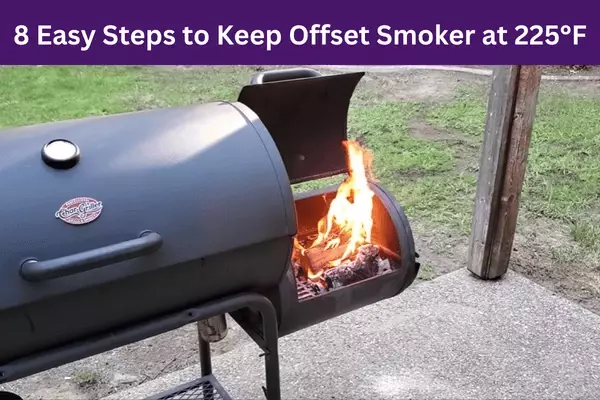How to keep Offset Smoker at 225°F: 8 Steps for Perfect Barbecue
If you’re on the BBQ Addicts forums or just starting your journey into offset smoker cooking, maintaining a steady temperature, especially at 225°F, is crucial for achieving that perfect smoky flavor. This comprehensive guide will not only outline steps but also provide insights and troubleshooting tips for a foolproof barbecue experience.

When using an offset smoker, understanding the nuances of temperature control is essential. This guide aims to equip you with not just steps but the knowledge to master your offset smoker and produce juicy, flavorful smoked meats.
Additional Resources:
Visit our post on the “Best Offset Smoker” for additional details on how to select the best offset smoker for your requirements. It offers insightful commentary and suggestions to support your decision-making. We Also reviewed budget-friendly Offset smokers under 500. Have a read and go for the Best option that fulfills your needs and requirements.
8 Steps to Maintain 225°F in Your Offset Smoker:
We will discuss 8 easy steps on How to keep offset smoker at 225 in detail below.
1- Read the Manufacturer’s Manual
Before you fire up your offset smoker, thoroughly review the manufacturer’s manual. Understanding your smoker’s capabilities is vital for maintaining a steady temperature. Many smokers come with built-in thermometers; familiarize yourself with them to use as a guide.
2- Set Up a Probe Thermometer
Invest in a good probe thermometer for accurate temperature monitoring. Place it strategically for indirect cooking, avoiding proximity to hot coals. This prevents heat conductivity from affecting readings. The probe allows you to monitor your meat without frequent lid openings, maintaining a consistent cooking environment. Read out our detailed guide about where to probe brisket.
3- Get it up and Maintain it
Achieving the desired temperature is one thing; maintaining it is another. Monitor your smoker until the temperature stabilizes. Adjust airflow for charcoal smokers and control fuel for wood-fired smokers. Practice patience and be observant; adjustments depend on what’s happening inside your cooker
4- Use Grill Thermometer
A grill thermometer helps estimate cooking time. Set a timer, add wood when needed, and check your meat regularly. For pork chops or ribs, plan 2-4 hours; chicken may take 4-6 hours, while ham might need 8-12 hours.
5- Make Sure You Have Adequate Fire
Consistency relies on a hot fire. Use dampers to control airflow and add wood chunks or logs when necessary. Monitor smoke from the chimney; it’s a good indicator of fuel sufficiency.
6- Add Lump Charcoal to Firebox
Before anything else, ensure sufficient fuel in the firebox. Add a layer of lump charcoal for even heat distribution. Adjust vents for ventilation, crucial for maintaining an even cooking temperature.
7- Wait Until the Charcoal Is Hot Before Adding Wood
To avoid temperature fluctuations, wait until the charcoal is hot before adding wood. Start with half a chimney of lit coals, adding more as needed. Limit wood chunks to avoid cold spots in your grill.
8- Add More Wood As Needed
Wood is crucial for smoking. If your meat is taking too long, add more wood. If there’s little smoke, introduce wood chips. Observe flame color – a blue flame indicates low heat, while a yellow-orange flame suggests high heat.
Frequently Asked Questions
Conclusion
While alternatives like ovens or grills exist, the unique flavor from smoking keeps many enthusiasts hooked. To enhance your offset smoker experience, consider placing the water pan on the top grate, check your smoker hourly, and invest in a digital probe thermometer for precision.
